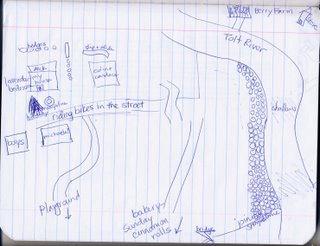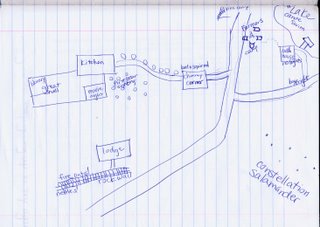During the year, they sponsor a workshop series (five dates, at the borough offices once a month or so) on various aspects of both literacy and math (separately, of course; do you think we're some kind of commies or something?). They give out at least one book during the year. I think this fall we got one called The No Nonsense Guide to Teaching Writing. Last year we got several, but I can't remember. I know that we each got a couple of content reading books; that was fantastic. Usually the facilitators guide you through ideas and potential lessons. They also have you do reflection and brainstorming and mini-lesson creation, so you do get a lot of resources for your time (4-7, approximately).
Not to mention, you get the standard UFT catered dinner. And best of all, you get training rate--about $18/hour, which after taxes is fifty dollars per session. Pretty sweet deal, if you ask me.
And actually, my other favorite thing, as always, is time to get to know your colleagues in education and your borough. This year, a bunch of teachers in my school signed up for the series. Four of us were in the same room, and it was great to see them in a different capacity than school, and chat (fairly leisurely) as adults, not harried and hurried classroom drones.
Anyway, this week kicks off its summer workshop institute. It goes for four days, also with food (breakfast this time) and resources. The literacy one began this week, and runs again next week. The math one goes in August, I believe.
This one is extra special: today there was a special guest speaker, Ralph Fletcher! In case you aren't familiar with him, he has written a number of books on writing (as in, teaching writing and helping kids improve their writing), especially the writer's notebook. He's written children's fiction and poetry as well.
He discussed many interesting things, illustrated by examples of kids' writing. Writing should be fun and something you chose. The writer's notebook is a place to react to the world. It's not used not only for introspective journaling, but also collecting: poems, drawings, cards, pictures, words or quotes you like, artifacts, memories. He showed us his own (very posh) notebook, in which he had taped many of his own memories and artifacts. He showed two kids' notebooks: one had a piece of balloon from the field day taped in, and the other had the insides of the writer's favorite pen taped in, along with a 'date died.'
He showed us how he discovered a topic he was interested in, like twilight or the moon, and how he wrote as much as could, little bits and pieces in his notebook, and then how those bits eventually grew into real books (Twilight Comes Twice, and Hello, Harvest Moon).
Here's a great activity he had us all do: First he showed us an illustrated map of his own childhood neighborhood, with important places marked. Then he had us draw our own maps of a place we knew well. Then we shared with neighbors.
Here's my terrible map of one of my childhood neighborhoods that I always loved.
 It's Carnation, a tiny town in the rural outskirts of the suburbs. The four boxes are our old house and the surrounding three houses. There were kids in all four, and we all played together. Next door had a Slip and Slide, so most of the summer play was in their backyard. They also had a weiner dog that chased me around my own house. We sometimes played with a trampoline in our front yard. We all always rode our bikes in the street.
It's Carnation, a tiny town in the rural outskirts of the suburbs. The four boxes are our old house and the surrounding three houses. There were kids in all four, and we all played together. Next door had a Slip and Slide, so most of the summer play was in their backyard. They also had a weiner dog that chased me around my own house. We sometimes played with a trampoline in our front yard. We all always rode our bikes in the street.
Nearby was a little playground. A little further on was the bakery where we usually got cinnamon rolls on Sunday mornings.
The best part of Carnation was the river. The Tolt is a quiet, meandering and rocky little river that joins the larger and sandier Snoqualmie River right up the road. We went there all the time, decked out with actual tennis shoes to walk (more) comfortably on the rocks of the 'beach' and in the river itself. Occasionally we brought inner tubes to float on the gentle current (though we'd have to 'portage' in the rocky shallows). It was always a pleasant and fun place to be. Even more so on those really hot days; the river comes right from mountain streams and is freezing cold.
Down the road and around the bend is Remlinger Farms, where you can pick berries, pumpkins, and probably other things too. They sell food and treats and crafty things in their barn store. It always smelled good in there, both earthy and slightly sugary.
Once we all had drawn and shared, he guided us in marking: a power spot, where people gathered; a danger spot where you weren't supposed to go; a favorite place; and a secret spot.
The idea is that you can take this one activity and easily pull from your many experiences at least one spark of an idea to create a writing piece.
Here's another one ripe with sparks:
I drew a map of Trailblazers. I could more easily mark stories on that one: the place where I spotted the first bear of our adventure; the bath house with no electricity; the corner where all the boys scared the crap out of all us girls returning up the dark road late at night; the rock wall that we dug up and got attacked by fire ants and nettles; the smallcamp where we built our most-excellent round-to; the cabin we lived in with a bat and a flying squirrel; the lake where we canoed to the far camp and once went swimming; the dock where we had to scrape paint; the corner room in the dining hall where we had a slumber party, covering the floor in a double-layer of camp mattresses, building a roaring fire and watching an 80s movie. Oh, and that's the constellation that I used to look at when I walked to the dock at night with no flashlight to challenge my bravery and nightvision.
The last section of his talk was about the Qualities of Writing: Ideas, Design, Language, Presentation, all of which should be infused with Voice. Additionally, writing should have good Organization, Focus, Beginnings, Endings, Time, and Shape.
He read us a splendid and hilarious book, called Scaredy Squirrel by Melanie Watt. It's about a paranoid squirrel who eventually finds that he can safely explore more of the world outside his tree. It helps us think about conquering the fear of the unknown.
Mr Fletcher was a lively and engaging speaker with plenty of entertaining examples. I really feel reinvigorated about teaching writing to my kids this fall. I think I'll have to make them get three notebooks: one as a writer's notebook, one as a reading response book, and one as a workbook (for notes and things). I will ask them to do this mapping activity, list important moments in their lives so far, write about moving/friends/family/pets, find interesting words and snippets of their books, things they wonder about, describe their environments in new and vivid ways, and listen to the world around them, noise from nature and humans alike.
Yet another summer to-do will have to be writing about all these things myself! It's been awhile since I did any journal writing. It'll be really fun to share my work with the kids and have them share theirs.
I sure hope that some of this will also inspire you to think about writing in a new way. If you are a teacher in any grade, I highly recommend Ralph Fletcher's books, for you and for your students.
I'm excited for the next three days of this workshop!
1 comment:
I also have his books. I wish I were a part of this course, and I'm glad the Teachers Center is getting Columbia's Teachers' Reading and Writing Workshop speakers and charging, I hope, a much affordable rate for the course.
We do not have a TC in my school, so we never get any information about their courses the way other schools do. I have taken their courses that are advertised in the NY Teacher and some that have were available through schools with TC. Some I liked, some I haven't, however there was always food! If they can get more speakers like Mr. Fletcher, that would be great!!!!
Post a Comment